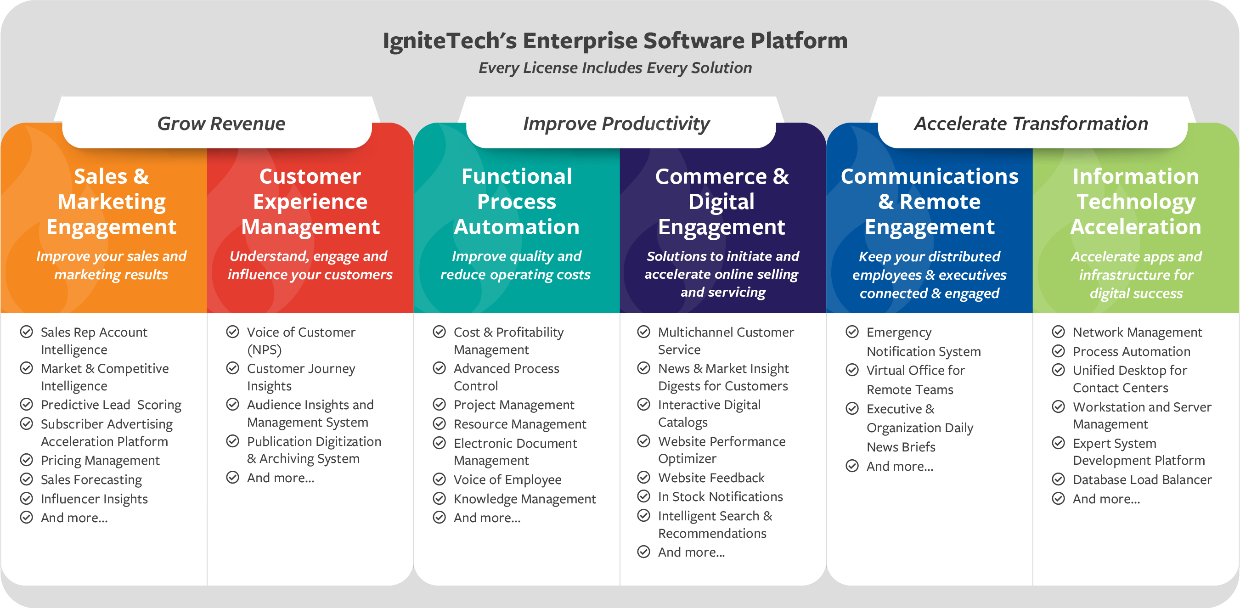Once the stuff of science fiction, artificial intelligence (AI) technology has become an essential part of business processes in many industries. The term “artificial intelligence” describes a broad array of solutions that can handle complex problem-solving typically handled by humans.
As a result, AI tools offer an upgrade on earlier counterparts because they can draw actionable conclusions from data. Many of today’s top enterprises use AI to automate their most tedious tasks, allowing staff to focus on strategic work and decision making (so no, the robots are not our overlords).
Two key areas where AI solutions are making a difference for businesses are in sales and marketing. These solutions improve efficiency by giving sales reps insight as to which leads need nurturing, or they can provide up-to-date market intelligence. In an economy where every bit of market share matters, AI-powered sales and marketing tools can make all the difference.
The Impact of AI
While not yet universal, AI technology has become commonplace enough to prove its value. According to McKinsey’s ‘The State of AI in 2020’ survey, AI adoption, like most other digitization efforts, has sped up since the beginning of the COVID-19 pandemic — with about half of respondents now saying they have at least one use for the technology. Notably, however, only 17% of respondents are currently using AI for marketing and sales purposes. This means that getting ahead of the curve on sales AI implementation could give you a real advantage over most of your competitors — including access to new market insights.
Perhaps most significantly, the survey noted an increased disparity between those who have already adopted AI solutions and those who have not. Companies at the forefront of AI adoption reported benefits like improved performance and improved corporate leadership — with some reporting more than 20% of their revenue was the result of AI solutions. The bottom line? If you haven’t created an AI implementation plan, now is as good a time as any.
Getting an Edge on the Competition With AI Solutions
With proven solutions whose impact can be easily identified and measured, your sales and marketing departments are the perfect places to begin your AI revolution. Potential benefits of an AI-enabled sales tool include:
1. Increased lead generation
Who doesn’t want more potential leads? AI technology makes it easier to analyze a marketing campaign and determine which components are generating leads and which ideas should probably be left in the boardroom. The end result is continued and measurable improvements from one campaign to the next.
AI solutions not only analyze your existing marketing efforts but actually offer new avenues for enterprises to reach potential customers. One of the most common examples of an AI-powered lead generation tool is the chatbot. These pop-ups are an easy way to collect important information and bridge the gap between customers and the sales reps who want to speak with them.
2. Lead nurturing that fosters real relationships
Of course, generating new leads is just the start of your sales funnel. AI technology can use predictive lead scoring to help your sales team prioritize certain leads — both for the potential size of a sale and the increased likelihood of a conversion. Predictive lead scoring works by looking at both how a customer or client fits into your target audience and whether their interaction with your website, sales team or marketing material indicates purchase intent.
For example, a B2B company would use predictive lead scoring to analyze factors like a company’s size and revenue to see if they’d be a logical fit for the product. An AI tool would be able to pick out trends among past buyers and use it to identify leads with similar characteristics. Combining that with behavior-based indicators such as form submissions or pricing page views on your website will show you which leads are most ready to buy now.
3. Improved market intelligence
Market intelligence (MI) describes the information and insights business leaders use to make their decisions. MI includes internal business intelligence (BI) as well as external competitive intelligence (CI) and other industry and market factors. Because MI requires both data analysis and actionable conclusions, it’s an area that’s ripe for AI innovation.
Enterprises use AI to integrate applications and scour disparate data for trends. One common approach is to combine your CRM data and market research for MI that reflects both the overall state of the industry and your place in it. In addition to these big-picture improvements, a MI system can also increase sales representative efficiency by offering real-time insights on accounts and territories.






